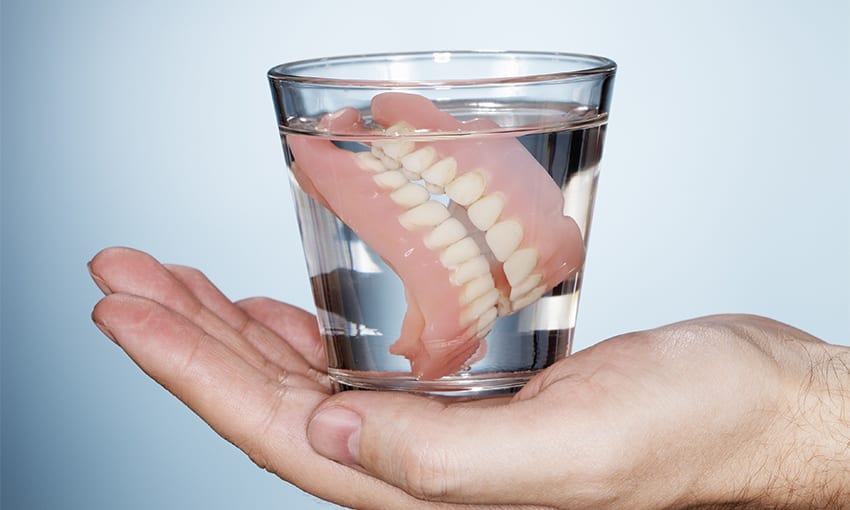Are you a denture wearer who has experienced the unfortunate mishap of damaging your dentures? Don't worry, it happens to the best of us! Dentures are an essential part of many people's lives, providing them with the ability to eat, speak, and smile confidently. However, accidents can happen, from dropping your dentures to biting down on something too hard. Here, we will explore what you should do if you find yourself in this situation and how to handle denture damage like a pro.

Understanding Dentures
Dentures, also known as false teeth, are removable dental appliances that are designed to replace missing teeth and restore your smile. They consist of artificial teeth set into a gum-colored base made of acrylic or metal. Dentures can be either partial or complete, depending on the number of missing teeth you have.
Common Causes of Denture Damage
Dentures are a significant investment in your oral health, so it's crucial to understand the common causes of denture damage. By being aware of these factors, you can take steps to prevent potential problems.
- One common cause of denture damage is accidental dropping. It happens more often than you might think! When dropped on hard surfaces, such as bathroom tiles or kitchen countertops, dentures can crack or break. To minimize the risk, handle them with care and consider using a towel or basin filled with water when cleaning them.
- Another culprit for denture damage is improper cleaning techniques. Harsh brushing or abrasive toothpaste can scratch the surface of your dentures over time, making them more susceptible to stains and bacteria buildup. Always use a soft-bristle brush specifically designed for dentures and mild cleansers recommended by your dentist.
- Chewing on hard foods like ice cubes or popcorn kernels can also lead to cracks and fractures in your dentures. While they may seem sturdy enough to handle anything, remember that they are not as strong as natural teeth. Avoid biting down forcefully on hard objects to preserve their integrity.
- Changes in temperature can affect the fit of your dentures over time. Exposure to extreme heat or cold can cause warping or distortion in their shape, affecting how well they sit in your mouth. Be cautious when consuming hot beverages, and avoid placing them near sources of direct heat like stovetops.
By understanding these common causes of denture damage, you'll be better equipped to protect and maintain the longevity of your dental prostheses.

Denture Care
Proper care is crucial to maintain the functionality and longevity of your dentures. Here are some essential tips to keep them in good condition.
Clean your dentures daily: Remove and rinse your dentures after meals to remove food particles and prevent stains or plaque buildup. Use a soft-bristle brush specifically designed for denture cleaning, along with mild soap or denture cleaner. Avoid using abrasive cleaners that can damage the surface.
Handle with care: When handling your dentures, be gentle and avoid dropping them, as they can easily break or warp. Always hold them over a towel or basin filled with water to cushion any accidental falls.
Keep them moist: Dentures should not be allowed to dry out as this can cause them to lose their shape or become brittle. Soak your dentures overnight in a mild soaking solution recommended by your dentist.
Maintain oral hygiene: Even if you have full dentures, it's important to clean your mouth thoroughly every day by brushing your gums, tongue, and palate with a soft toothbrush before inserting the dentures.
Regular dental check-ups: Visit your dentist regularly for routine check-ups and professional cleaning of both your natural teeth (if any) and the supporting tissues under the removable appliance.
By following these simple guidelines, you can ensure that you take proper care of your dentures, extending their lifespan while maintaining optimal oral health.
Things To Do If You Have Damaged Your Dentures
If you find yourself in the unfortunate situation of damaging your dentures, don't panic! There are steps you can take to address the issue and get back to smiling confidently.
Assess the extent of the damage. Is it a minor chip or crack? Or is it a more significant breakage? This will help determine what course of action to take next. If it's a minor issue like a small chip, it may be possible to smooth out the rough edges using an emery board or dental sandpaper. However, this is only a temporary solution and should not replace professional care. For more extensive damage or if your dentures are broken into pieces, it's crucial to contact your dentist as soon as possible. They have the expertise and tools necessary to repair or replace your dentures effectively. In the meantime, avoid wearing damaged dentures, as they can cause irritation or further harm. Instead, store them safely in water or a denture-soaking solution until you can see your dentist.
Remember that attempting DIY repairs on your own can lead to further complications and potentially irreparable damage. Leave it to the professionals who have experience dealing with denture repairs.

Fixing Damaged Dentures At Home
Fixing your dentures on your own may seem like a convenient and cost-effective solution. However, it is important to consider the potential risks involved before attempting any DIY repairs. Dentures are delicate appliances that require professional expertise to ensure proper functionality. Attempting to fix your dentures without proper knowledge or equipment can lead to further damage. Denture repair requires precision and skill to ensure a seamless restoration of its structure. Without the necessary tools and experience, you may unintentionally cause more harm than good.
Moreover, dentures are custom-made for each individual's unique oral anatomy. Trying to repair them yourself can alter their fit and compromise their effectiveness in restoring your smile and ability to chew properly.
Additionally, using harmful chemicals or adhesives not specifically designed for denture repair can have detrimental effects on both the appearance and function of your prosthetic teeth.
To avoid these potential pitfalls, it is always recommended to consult with a dental professional if you have damaged your dentures. They possess the expertise needed for accurate assessment and appropriate repairs that will ensure optimal comfort and functionality of your dentures.
Frequently Asked Questions
Q: What can I do if a tooth falls out of my dentures?
If you ever experience the unfortunate event of a tooth falling out from your dentures, there are steps you can take to address this issue. Firstly, don't panic! Gently remove any loose fragments and inspect the area for damage. It is crucial not to attempt fixing it yourself by using glue or other adhesives, as this may cause further harm. Instead, contact your dentist immediately and schedule an appointment to have it professionally repaired. Dentists possess the expertise and specialized tools required to efficiently restore your dentures' functionality without causing any potential harm.
Q: Why do dentures become warped or cracked?
Over time, it's not uncommon for dentures to develop warping or cracks due to various factors that impact their structural integrity. One key reason is changes in temperature; extreme heat can lead them to warp, while sudden exposure to cold temperatures might cause them to crack. Additionally, general wear and tear resulting from daily use can weaken the material over an extended period—chewing on hard foods or accidentally dropping them onto hard surfaces may exacerbate this situation. Regular oral hygiene practices such as improper cleaning techniques or using harsh chemical agents could also contribute to damaging these delicate dental devices.
Q: How long should my dentures last?
Denture longevity depends on various factors, including maintenance, oral hygiene practices, and individual differences. Typically, well-cared-for dentures can last between five to seven years before requiring replacement. However, it's important to note that this estimate may vary for each person due to their jawbone structure changes over time or natural wear and tear.
In the end, taking care of your dentures is crucial to ensure their longevity and functionality. By understanding what dentures are and the common causes of damage, you can take proactive steps in caring for them. Remember, prevention is key – treat your dentures with care so they continue to serve their purpose in enhancing your smile and quality of life!
Visit Our Office
Office Hours
- MON - THU8:30 am - 5:00 pm
- FRIBy appointments only
- SAT - SUNClosed

